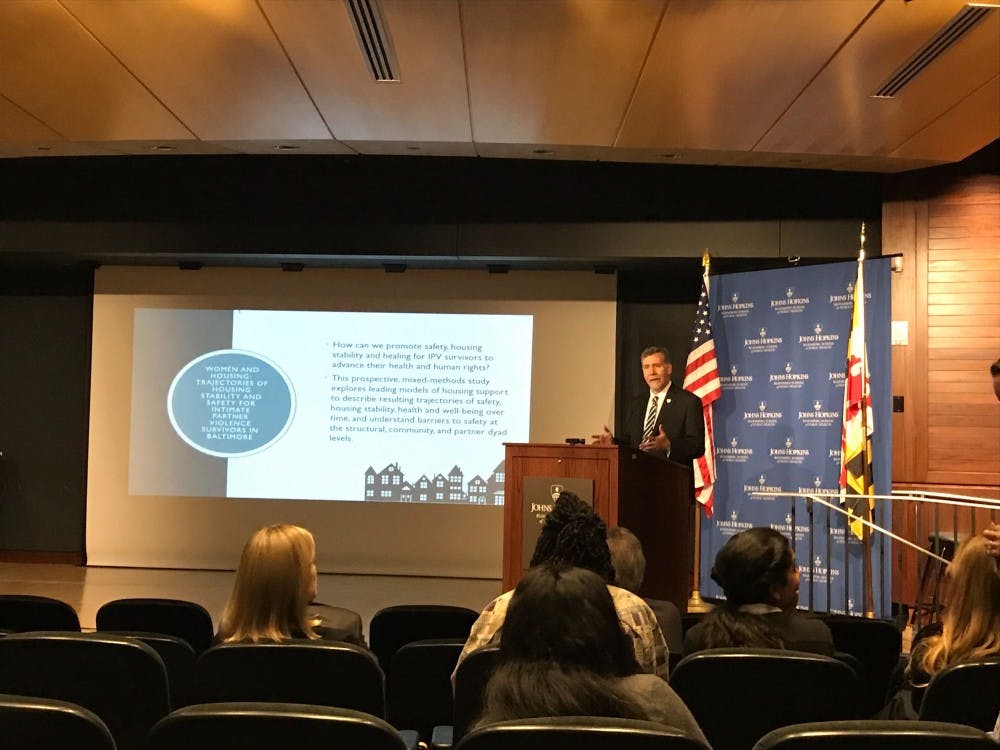On Tuesday, the Center for Public Health and Human Rights (CPHHR) hosted their annual Fall Symposium, celebrating the center’s 15th anniversary. The theme of this year’s event was “Paradigm Under Threat: Health and Human Rights Today.”
The event featured Jonathan Cohen, the director of the Open Society Public Health Program; Dr. Chris Beyrer, professor of Public Health and Human Rights at the Bloomberg School of Public Health and Dr. Kathleen Page, associate professor of Infectious Diseases at the School of Medicine.
Beyrer kicked off the event by introducing a new program for the CPHHR. In light of the ongoing global migrant crisis, he explained, the Center will be launching a program in Migrant Health and Human Rights which Page will direct.
Page spent two years studying migrant health at the Venezuelan border with Colombia and Brazil. She explained the impact that the recent economic collapse has had on Venezuelan society.
As the number of displaced persons rises, she explained, it severely limits the capability of the country to protect its public health.
“More than four million Venezuelans have fled the country,” Page said. “There have been shortages of electricity and water in hospitals, which make it almost unimaginable to operate a hospital without access to basic medication. In addition, there has been a huge drain of the professional medical workforce… Over one-third of physicians have fled the country.”
Page argued that the migration of Venezuelan refugees into neighboring countries has noticeably effected the mass politics of those countries.
She explained that the Brazilian and Colombian governments have been welcoming to Venezuelan refugees, providing health care and housing at the border. As a result, Page noted, there has been growing anti-refugee sentiment in these countries.
“Providing the right resources and supporting these governments as they’re doing this work is going to be critical to avoid further alienation of migrants,” Page said.
Page explained that while Colombia and Brazil provide vaccinations to the refugees they take in, the United States government does not follow the same public health practices.
This, she noted, has had severe consequences for the migrants.
“Unfortunately, in our country, several children have died of influenza at the border and so far the government has not agreed to supply vaccination for people who are coming through the southern border,” Page said.
Cohen emphasized the connections between public health, human rights and open societies, and the relevance of these networks.
“The conditions that make people healthy — the freedom, equality, inclusion and autonomy that enable us to make healthy choices — are the precise conditions that characterize open societies. This is the core insight that powers our work in health,” Cohen said.
Attendees reflected on this interconnectedness of public health and human rights.
Bate Powers, a senior research program coordinator for CPHHR, explained how she views the panel’s emphasis on the intersection of the two topics as vital.
“They’re both lenses or frames that encompass a variety of different things that affect people’s lives, and so I think that both of those are things [that] help me to keep in mind, even though I might be working on a particular topic or area there’s lots of other things that intersect with that and then effect the potential outcomes of what I’m working on,“ Powers said.
Cohen also explained how important it is to prevent anti-refugee sentiment from driving public health malpractice and human rights abuses.
“Anti-migrant policies have led to alarming intrusions of health rights,“ Cohen said.
Beyrer commended the Bloomberg School of Public Health for allowing its researchers and professors to freely share their political beliefs and opinions without restriction.
Working at the crossroads of public health and human rights work, he said, is deeply challenging work to do within many academic contexts.
“It’s often very fraught work, and it, almost by nature, means that you have to engage in the political space... and that’s not easy to do in the context of an academic institution,“ he said. “No one has told us what not to engage in. That’s part of what makes the Bloomberg School at Johns Hopkins such a special place.”
Cohen ended his component of the presentation by invoking metaphors to express his hope for the future, in that he sees a lot of places that the program can facilitate change moving forward.
“We like to say at our foundation that we view public health as a window and a door. A window into the challenges facing open societies and a door of opportunity for change,“ Cohen said. “If this is the case, I think the view out the window is surely bleak but the door is assuredly wide open.”
Jeff Herman, also a CPHHR senior research program coordinator, offered that talks such as this are helpful for providing a common dialogue that allows attendees to speak on issues.
“We talk about the issues but we don’t have lenses to look at them through,“ he said. “Maybe that’s the purpose, to introduce human rights language and that lens to issues.”





